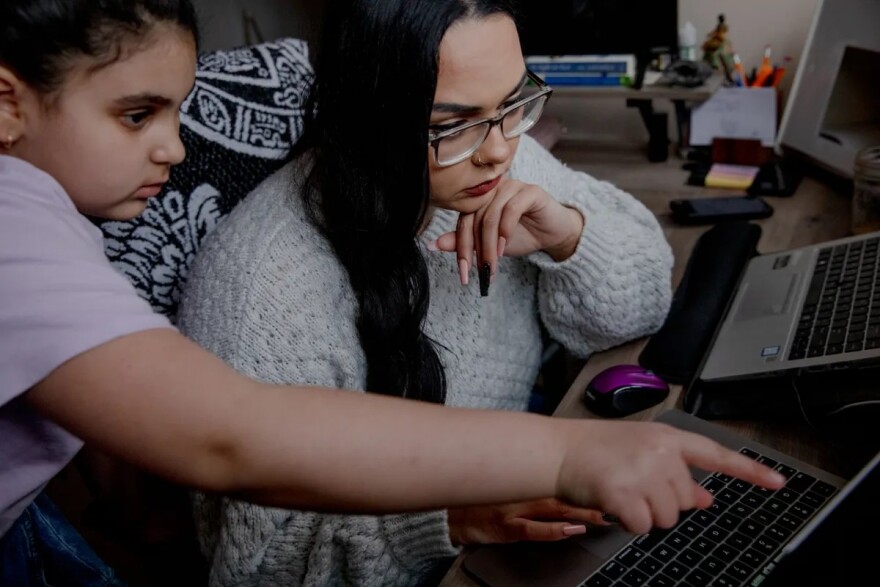Brandi Kennedy prefers to focus on the positive in life. Between her master’s degree coursework, her full time job at a Middletown nonprofit, her internship with the Connecticut Women’s Education and Legal Fund and raising her two children, the 31-year-old single mother is spread thin.
But she believes in the work she’s doing as a Family Violence Victim Advocate in Middletown’s Community Health Center.
“In order to not see nonprofits kind of go down in a pretty depressing and dead end road, it’s going to require people to stick it out and really fight and advocate for that sector,” said Kennedy, who is working toward a master’s in social work at the University of Connecticut.
But sticking it out is hard for someone like Kennedy, who will be $100,000 in student loan debt once she graduates in May.
She has no idea how she’s going to pay it back.
According to Education Data, Connecticut students owe, on average, $35,448 in student loan debt. Kennedy is so overwhelmed by the prospect of paying hers back that she can’t bring herself to log into her student loan website to check her balance.
“I’m kind of trying to not look into it until I absolutely have to, [or] I will stress myself out,” she said.

There were at least six proposed bills in the beginning of the session that would relieve the financial burden of student debt. One of them, HB 5130, would reimburse student loan debt for nonprofit employees within the health care or human services fields up to $5,000 a year. To be eligible, a person would either need to work in the field or pursue their college degree at an in-state school within a year of the pandemic ending.
The bill is currently before the Appropriations Committee.
Rep. Brandon Chafee, D-Middletown, a co-sponsor of the bill, said that student loan debt is “out of control” in Connecticut and around the country.
“It doesn’t seem like the federal government’s gonna do much, unfortunately, and targeting, specifically the nonprofits, especially health care workers [is important],” he said. “I think the people who work through the pandemic deserve some sort of support more than just verbal accolades.”
Chafee said this is the right time to pass the bill because state finances are stable.
“We have surpluses right now, we’ve had plenty of federal stimulus and support coming in,” he said.
One bill this session which would help aid student loan borrowers is HB 5121. HB 5121 would provide an income tax deduction for student loan interest. There is also SB 33 which would fund a state ombudsman to guide students through the student loan process. Another, SB 271, would subsidize interest rates on authority loans for students working in health care.
Not only will student loan reimbursement help attract and retain new residents but it will also help prevent non-profit employees from feeling trapped by their debt — employees like Kennedy, Chafee said.

Kennedy knows she could probably earn more money elsewhere, but said she is passionate about working for a nonprofit.
“It’s a sector … that does really important work for some of the most vulnerable populations of Connecticut,” she said, adding that there’s a catch.
“The nonprofit sector is always going to have jobs, but the flip side of that coin is they’re not well paid jobs,” she said. “And, you know, they’re overworked. People working in nonprofits, they’re undervalued.”
Rep. Josh Elliott, D-Hamden and co-chair of the Higher Education and Employment Advancement Committee, said bills like the six pending in the legislature are important because there are a lot of different factors to paying off student loan debt that get overlooked.
“A lot of the cost of going to school is not just the cost of school, it’s all the extra costs,” he said. “It’s the inability to work, or the difficulty of working a full, 40-hour-a-week job and so not having that money come in while you still have your expenses, your living expenses, whether it’s food, gas, your living expenses for your house or apartment. And that’s something that I think gets lost in the conversation as well. It is just that the cost of living is getting more expensive.”
Chris DiPentima, president and CEO of The Connecticut Business & Industry Association (CBIA), said Connecticut is in a workforce crisis and needs to figure out how to attract potential residents to take vacant, skilled jobs. DiPentima said the state needs to pull in new residents and convince residents who already live here to stay.
DiPentima said that Connecticut needs to focus on attracting and retaining young talent. Yet, he says, there are a lot of barriers pushing young people out of the state, like poor public transportation and high taxes.
“So anything we do from a legislative point of view to knock down those barriers to keep Connecticut talent here, it would be tremendous, we [the CBIA] fully support it,” DiPentima said.
As Kennedy gets closer to her graduation this May, she said she still isn’t sure where her future will take her.
“I have family in Texas and Nevada,” she said. “So I’ve looked at the job markets in their states and the cost of living and it’s much, much more affordable. So I always have that in the back of my mind.”

